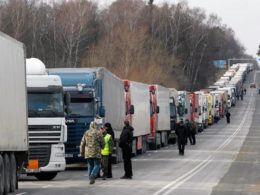With Russia’s war against Ukraine raging next door, Poland is taking steps to enhance its national self-defense capabilities and civil readiness, invoking a new law to activate its citizens’ potential for emergency response.
According to an Associated Press report, Poland’s government has prepared legislation to boost the nation’s capacity for self-defense, prompted by the war that neighboring Ukraine is fighting against Russian aggression. The bill, set to be presented to Parliament in May after public consultations, aims to increase funding for first aid courses, improve public warning systems, and expand the number and quality of emergency shelters.
“Because of the developments that we can see across our eastern border, we are talking here about extreme situations…, about an armed conflict,” Interior Minister Marcin Kierwiński told the AP.
Defense Minister Władysław Kosiniak-Kamysz emphasized the deterrent nature of the bill, stating, “We must be ready for every potential situation.”
Key Provisions of the Self-Defense Law:
- Organized self-defense and first aid courses for citizens, including school children, starting this year.
- Improvement of Poland’s public warning systems to better alert the population in emergencies.
- Increase in the number and quality of emergency shelters nationwide, addressing a deficit identified by the state Supreme Audit Office. Currently, only about 4% of Poland’s 38 million residents would have access to proper shelters in an emergency.
The law will also provide financial support to local authorities, who will play a crucial role in implementing the self-defense measures. Funds will come from the Polish government as well as recently unfrozen European Union funds, following the election of a pro-EU government in December.
As Russia’s war against Ukraine drags on, with Russia occupying territory in the east and Ukraine running low on ammunition, Poland’s proactive steps underscore the perceived threat to its own security. The self-defense law aims to better prepare the nation and its citizens for potential escalations or spillover effects from the war next door.
“We are not trying to frighten anyone, but we must be ready,” Kosiniak-Kamysz told the AP, emphasizing the deterrent and preparedness objectives of the legislation.
The expanded civil defense measures come as Warsaw Mayor Rafal Trzaskowski announced plans to invest 117 million zlotys ($30 million) into upgrading existing shelters and adapting other sites for emergency use within the city. This local initiative aligns with the national law’s goal of improving shelter availability, a crucial aspect of civil readiness.
While the full impact of the law remains to be seen, it represents a significant shift in Poland’s approach to civil defense and emergency readiness. As the Russia-Ukraine war continues to unfold, the Polish government is taking concrete steps to bolster its self-defense capabilities and engage its population in emergency preparedness efforts.
In recent developments, tensions between Poland and Ukraine have risen due to grain exports. Poland has imposed bans on Ukrainian grain imports, arguing that the influx of cheaper Ukrainian grain is harming local farmers’ incomes. This move has strained relations between the two countries, despite Poland’s strong support for Ukraine in the face of Russian aggression.
The blockades by Polish farmers at Poland-Ukraine border, which began on November 6, 2023, had caused significant disruptions, with over 3,700 trucks stranded, impacting both economies and delaying critical military supplies for Ukraine.






